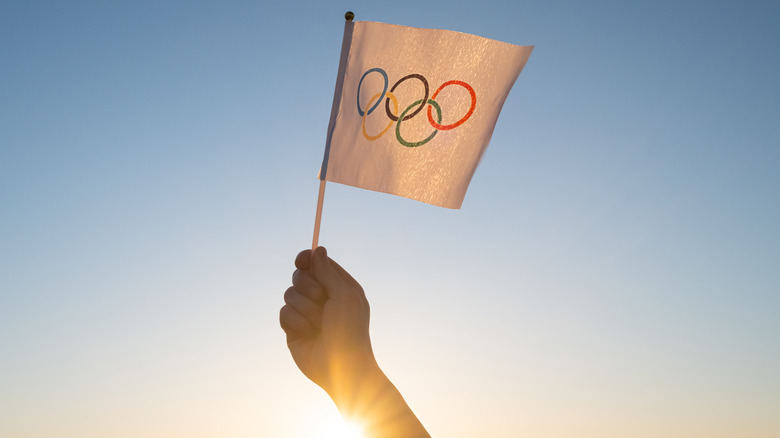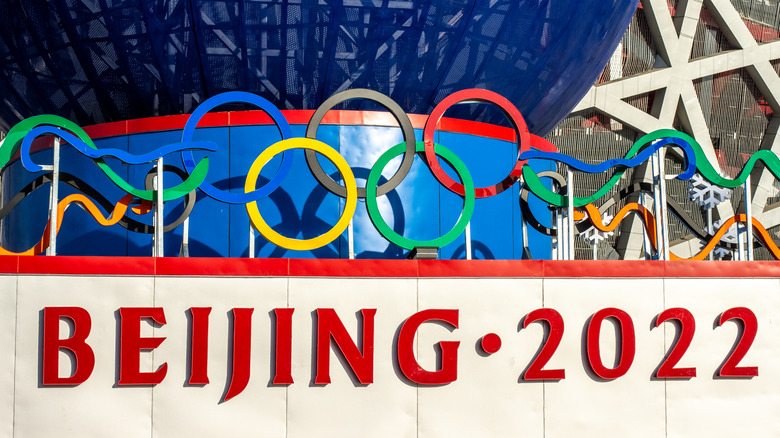What Really Happens When A Country Boycotts The Olympics
In December 2021, per NBC News, the Biden administration was expected to announce that it would be invoking a so-called "diplomatic boycott" of the 2022 Beijing Winter Olympics. This type of limited boycott, in which athletes would still be allowed to compete but in which no U.S. officials would attend, is one of multiple options on the table that the U.S. and other countries are considering before the Olympiad begins. Other options reportedly being considered by other countries, according to the Council on Foreign Relations, are a full-on boycott of the games, in which no athletes are allowed to participate and spectators and government officials do not attend.
The threats of boycotts largely stem from the host nation's purported human rights abuses, particularly in the Xinjiang region, where China is accused of persecuting the Uyghurs, a Muslim minority, as well as its crackdowns on freedoms in Hong Kong, and its alleged repression of Tibet. Whether the U.S. will proceed with its boycott, whether any other nations will join in, and what effect, if any, these will have on the 2022 games and future diplomatic relations between China and the boycotting nations remains to be seen.
There are several ways to boycott the olympics
There is no one way to boycott an Olympiad. The scope of a boycott can range from one or two athletes making a statement to an entire country sitting it out to involvement — in one way or another — from sponsors.
As the Council on Foreign Relations notes, the International Olympic Committee (IOC) does not permit athletes to make political statements during the games, although the U.S. Olympic & Paralympic Committee has already said that it will not punish American athletes who protest in Beijing. The diplomatic boycott would allow athletes to participate while keeping officials and dignitaries home, and of course, there's always the nuclear option of a full boycott.
Outside the athletes and their host nations, there's always the possibility that sponsors could flex their muscle, such as by withdrawing sponsorships and money. However, as of this writing, none of the major sponsors of the 2022 games have given any indication that they're considering backing out.
Finally, there's the option of pressuring the IOC to move the games to another city, something which, by all appearances, is simply not going to happen as regards to Beijing and 2022.
It's hard to measure if a boycott works
Boycotting of Olympic Games has been a thing since 1976, according to the Council on Foreign Relations, when a handful of African countries boycotted the Montreal Olympics. A larger boycott followed in 1980, when the U.S. and multiple other nations fully boycotted the Moscow Olympics in response to the Soviet invasion of Afghanistan; the Russians responded by boycotting the L.A. Olympics four years later. As recently as 1988, North Korea fully boycotted the Seoul Olympics.
It's tempting to evaluate the outcome of a boycott in terms of its success or failure; for example, the boycott of the Montgomery, Alabama, bus system in 1955-1956 was a success in the sense that the goals of the community that enacted the boycott were eventually achieved. However, as the Council on Foreign Relations notes, with Olympic boycotts it's impossible to use the same prism. All the boycotted Olympiads of the past 50 years have gone on despite the boycotts, and Montreal, Seoul, and L.A. are not appreciably different cities because of them. Indeed, even in the case of the Soviet Union and the 1980 boycott, the only real outcome was a general failure of the Russians to earn international prestige from the games.
Further, boycotting China could backfire, and the country has already threatened a "robust response" to any protests.


